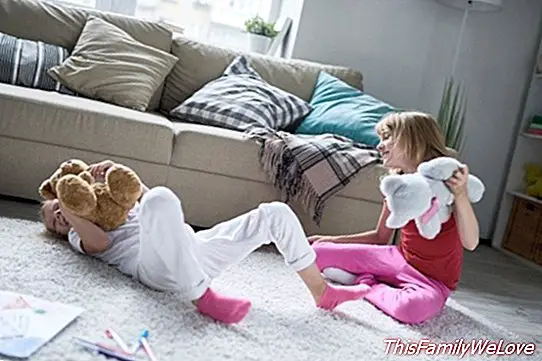What to do when your children's friends behave badly at home

During school holidays or on weekends it is very common for our children to invite their friends home to play or sleep. As parents this may imply that, on occasion, that invited friend does not fit precisely into the "ideal friend" profile. Children can be like day and night in regards to their education, their way of behaving and learned values. The situation can be even more complex if the friend is the son or daughter of someone you know.
How do we teach them to behave outside our environment?
Each family is different and there are no universal norms that define how a child should be educated. It is important to be flexible and accept the infinite variations with which we are going to find ourselves. That said, for our children to behave as we expect in someone else's house they have to learn some basic behaviors that safeguard their safety.
- Sincerity. Sincerity encourages children to be responsible for their own actions. No matter the specific situation: tell where they are going to sleep, where they have been, what activities they are going to do and where, with whom they have spent the afternoon, etc .: be sincere when giving information to parents or Other adults help to prevent children from making mistakes that can later take their toll.
- Respect. Respect covers both the verbal and the physical. Children must respect adults, other children, property, belongings and the laws of the different communities (school, city, urbanization, etc.) in which they live. Showing respect makes you safe from the unintended consequences of the lack of it, such as fights, problems with the police or other disciplinary.
- Self-control It consists of knowing which instructions or rules are valid in the situation or in the location where you are and in knowing how to apply those rules. The goal is to put a brake on impulsive decision making. Failure to do so can put the child in danger.
These three basic concepts will help your child meet the standards that will make him or her a welcome child in most settings. Teaching him these concepts will help him move with ease through the great diversity of situations he may have to face.
How to take over if a friend of your child is not behaving well
Educating each child is the responsibility of their parents. However, when the behavior of a child is not appropriate, you should put a brake on it and limit its influence as long as its behavior is causing harm to your children or to you.
1. Clarify what the rules of your family are. Maybe the child does not know what your expectations are. Explain what specific behaviors are not acceptable in your home and how you can correct their behavior. Also, tell him what you expect him to follow the rules you just explained him.
2. Limit harmful or disrespectful behaviors. Sometimes, children are unable to foresee the consequences of their actions due to their lack of maturity. When a child does things that are or may become harmful or disrespectful, interfere and tell him what the consequences might be if he continues as he has done up to now. Let it be clear to you that you can not allow it to continue behaving that way.
3. Praise positive behaviors. Most children respond very well to positive comments. Making him see that he is being good and that you value him is a great way to encourage and empower those behaviors that you would like to see more frequently. When you see that a child adapts well, behaves well or is kind and generous with others, throw some flowers and praise him. Later, when you see the child's parents, tell them how well they have behaved and do it in front of the child. In this way the praise has more weight and is more effective at having made it public, which increases the likelihood that the child will return to behave this well when he is back with you. If possible, be brief, precise and include the child's name when you address him / her.
Not all children have been educated in these three concepts, but this does not mean that you have to tolerate a child being a liar, disrespectful or without self-control.
Deanna Marie Mason, expert in education and family health. Author of the blog Dr. Deanna Marie Mason. Proactive fatherhood Professional support for the modern family. He has just released his second book: How to educate teenagers with values.




